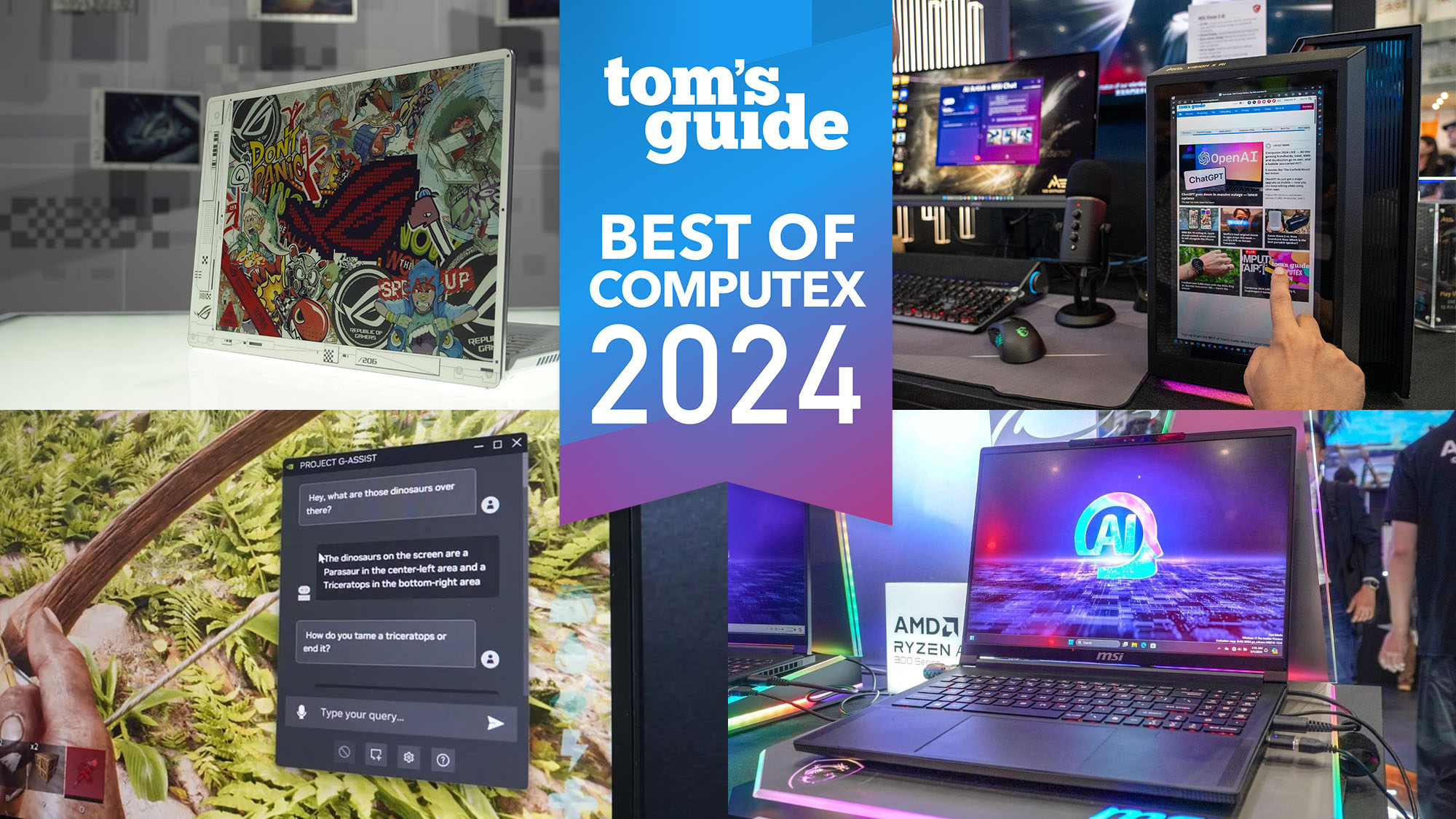
Computex 2024 has shown a huge evolutionary step in three key categories: AI, PC hardware and gaming handhelds. Well over 200 new pieces of tech were announced, and we’ve boiled this list down to the 11 biggest and most innovative products.
From the CPU that will define the next generation of windows and a gaming laptop that overhauls the definition of “value for money,” to an AI-infused gaming monitor and a chair with haptic feedback, we’ve fallen in love with a ton of tech.
Tom’s Guide’s team met with a whole bunch of companies and went hands-on with a ton of new products to bring you our Best of Computex 2024 list. Let’s get into it, and let us know if you agree in the comments!
Best of show: Qualcomm Snapdragon X Elite
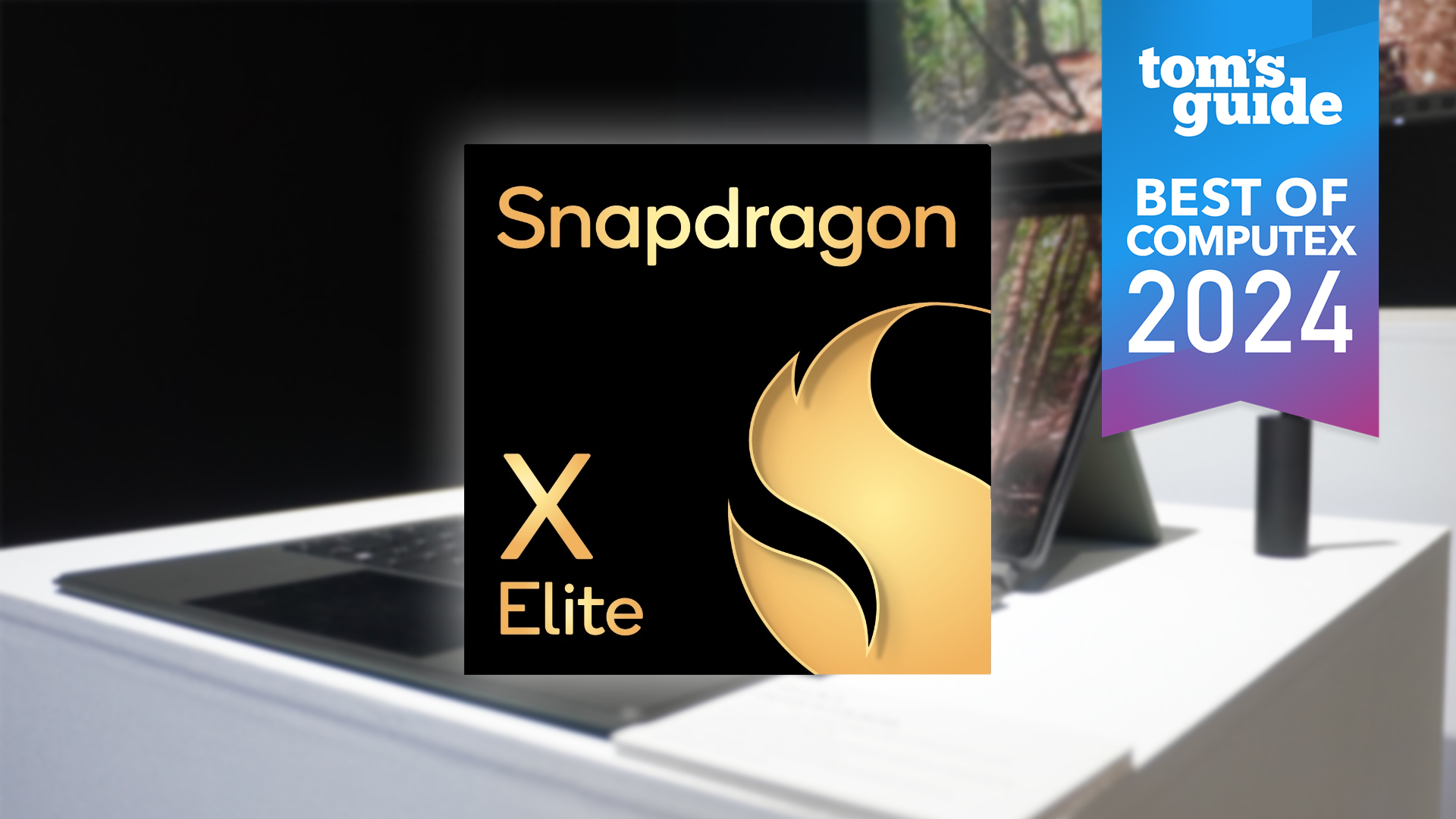
You may look at Computex 2024 and think it was dominated by Intel and AMD. In some ways it was — both came to the show in a big way with new AI-centric chipsets with NPUs that break through the Copilot+ PC barrier. The Ryzen AI 300 series touts impressive GPU performance too, while Intel promises up to 60% better battery life in its Lunar Lake CPUs.
However, there’s been a looming specter across the entire show. The winds of change are upon Windows, and arm could very well deal a death blow to x86 — led by Qualcomm Snapdragon X Elite. Let’s break down the silicon war unfolding in Taipei.
x86 has been the architecture used for Windows PCs for over 30 years now, using something called Complex Instruction Set Computing (CISC) to attack every part of your task equally head-on. It does the job well and has a rich history of apps, but is not the most power-efficient, which is the source behind a lot of our laptop battery life woes.
Arm on the other hand is super power efficient. Taking a mobile-first approach, this standard uses Reduced Instruction Set Computing (RISC) to break down complex tasks into barebones instructions and completes each one in a single tick of that chip’s clock cycle.
This isn’t the first time Microsoft has flirted with Arm, with its history strewn with failed experiments like the Surface Pro X and the vastly reduced app compatibility. But this time feels different.
With a slew of new Snapdragon-armed laptops like the Asus ProArt PZ13 and a reportedly dedicated focus placed on giving Arm its Copilot+ PC features first over x86, and reported performance and battery life numbers that can truly hang with the king of laptops, the MacBook, this is Microsoft’s M1 moment. Jason England
Best laptop: Asus TUF Gaming A14
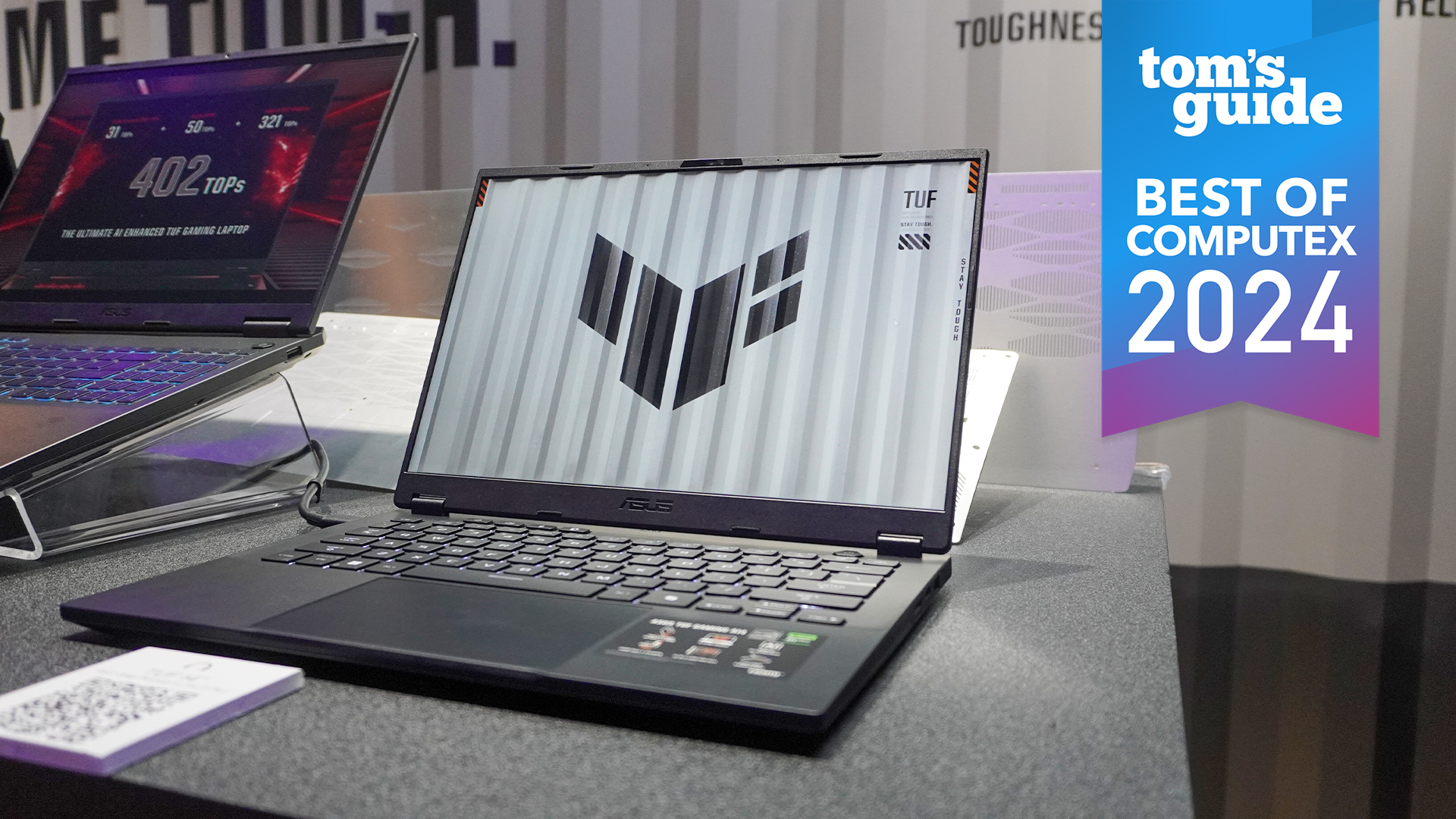
If the Asus ROG Zephyrus G14 is the Ford GT40 shown off to get you through the door, the Asus TUF Gaming A14 is the Mustang you actually leave the dealership with.
The TUF Gaming A14 takes all the best qualities of its more premium sibling, updates the CPU power to AMD’s latest and greatest, and makes small cutbacks that don’t compromise the experience to cut cost. Through a series of smart decisions, it’s easily my favorite laptop of the whole show!
It starts with a CNC-milled body that is lightweight at 3.2 pounds and thin at just 0.7 inches. It feels surprisingly light in the hand for the power it has — up to an RTX 4060 GPU and AMD’s brand new Ryzen AI 9 HX 370 processor. Combine these together and you’re getting up to 314 trillion operations per second (TOPs) of AI performance, which will turbo boost any AI-infused workload and maximize any enhanced game tech such as Nvidia’s DLSS 3.5.
Keeping it cool is the same impressive thermal management structure as the G14 including the dual 0.1mm thin fans, plenty of vents, and a redesigned keyboard that both feels great to type on and increases airflow.
The only corners being cut here are the drop from that gorgeous OLED to a QHD+ IPS panel with 165Hz refresh rate, which is still a good looker, and the switch-up from a full aluminum unibody to a mixture of the metallic material and plastic (still feeling premium to the touch).
I’m honestly quite surprised at just how much of its fancier model made it to the mid-range, such as we’ll leave fuller thoughts to our full review, but personally, this could be a sleeper hit of the year. Jason England
Best gaming laptop: MSI Stealth A16 AI+
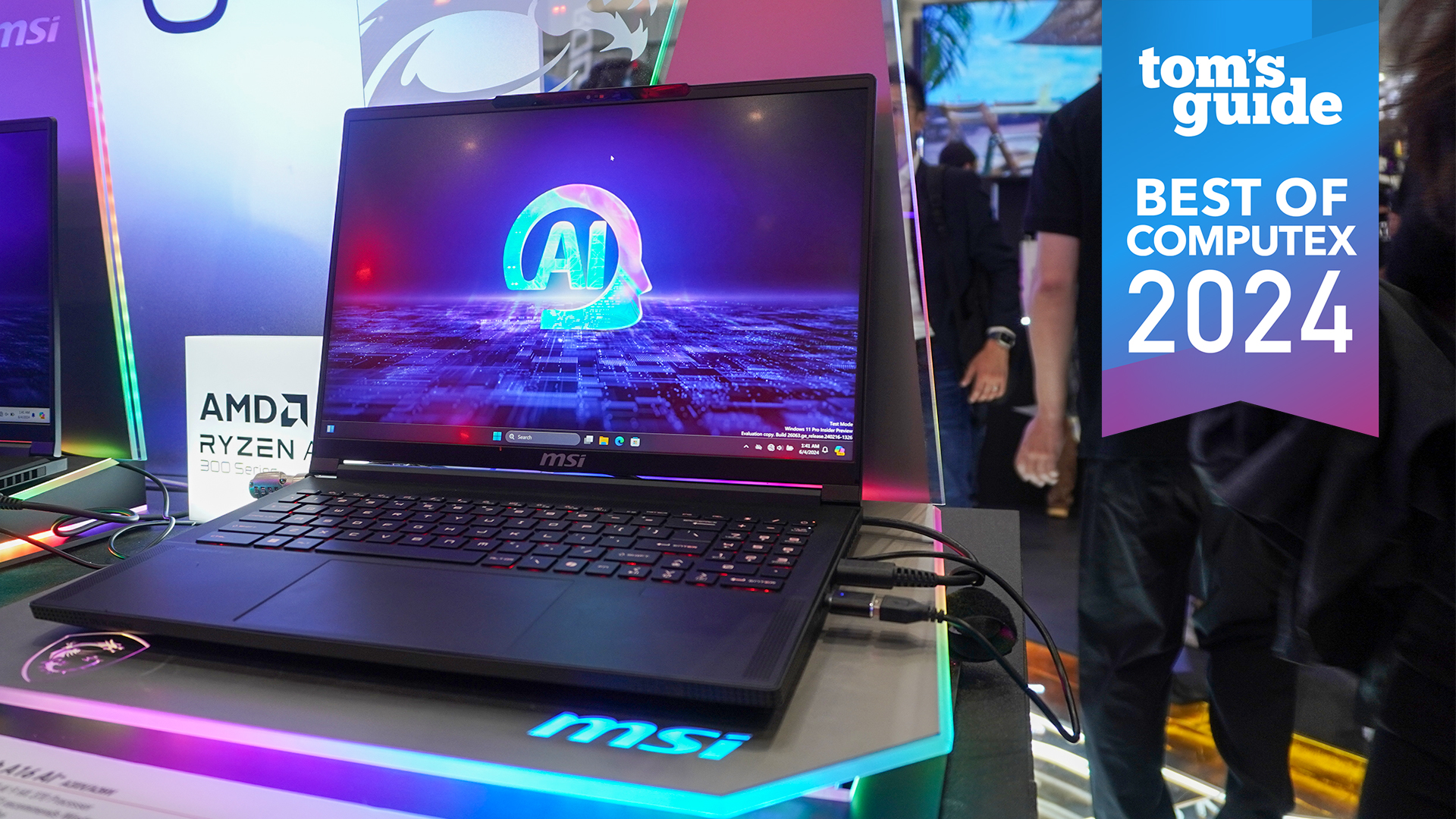
Say you want something bigger with more horsepower for that gaming prowess. Well, the best gaming laptop I saw bridges the gap between creator and gaming laptop perfectly. Allow me to introduce you to the MSI Stealth A16 AI+.
You’re getting the same AMD Ryzen AI 9 HX 370 as the TUF Gaming A14 above, but with RAM up to 32GB DDR5 and the choice of an RTX 4070 GPU, you’re getting much more performance. That’s matched equally with a gorgeous 16-inch QHD panel with 16:10 aspect ratio and a 240Hz refresh rate.
All of this is powered by a 99.9Wh battery (the maximum you can take on an airplane), and it’s crammed into a 0.8-inch thin shell and weighs 4.6 pounds. Definitely hefty, but pretty sleek when compared to other 16-inch gaming laptops.
And when it comes to the intersection between work and play, MSI has paid attention to the ergonomics with a lovely tactile keyboard and a snappy touchpad — alongside improving connection speeds to Wi-Fi 7. This ticks a lot of boxes and shone as a clear winner. Jason England
Best gaming accessory: Cooler Master Throne X
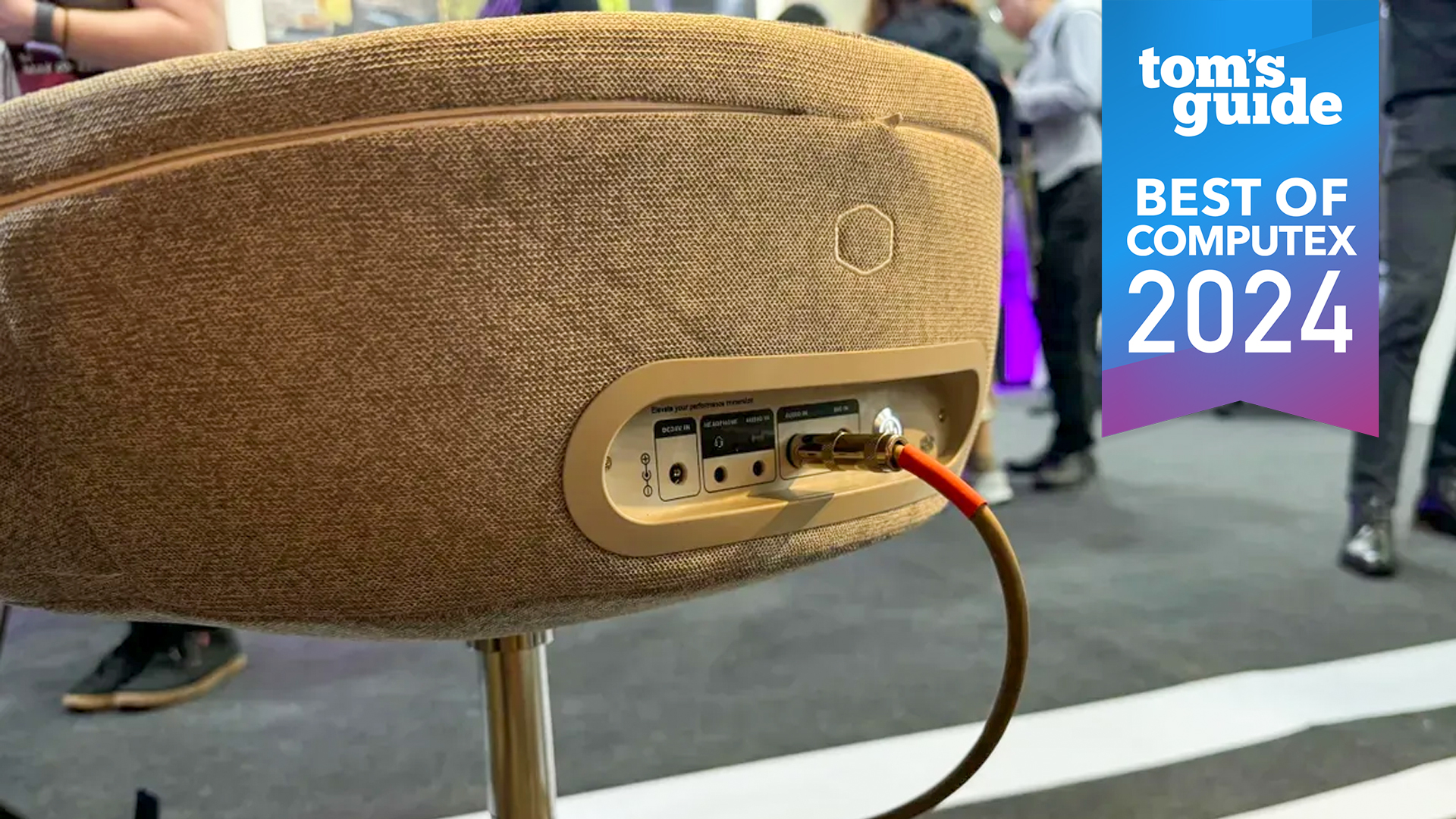
Cooler Master is stepping out of their comfort zone with their upcoming Throne X — targeting not the usual gaming PC enthusiasts but musicians looking to elevate their playing experience. The Throne X features built-in haptics in the seat, syncing with a metronome or the groove of the music being played, which provides a heightened sense of immersion.
Within my first 10 seconds of drumming on the electronic Roland set which was on stage, I immediately realized what made this seat so special. The haptics mimicked the feel of an acoustic drum set (especially the kick drum) — creating a rich, tactile experience without the bulk and noise of traditional drums.
It's not just for drummers, though. With its standard 1/4" audio input, the Throne X is versatile enough for guitarists, bassists, pianists, singers, or even just music enthusiasts wanting to feel every beat of their favorite tracks.
Amidst a tech show dominated by flashy PCs, the Throne X stood out. It was a refreshing change and a thrill to jam out to the small crowd that gathered around me, giving me 15 minutes of rockstar fame to the usual tech fare. Paul Antill
Best gaming handheld: Zotac Zone
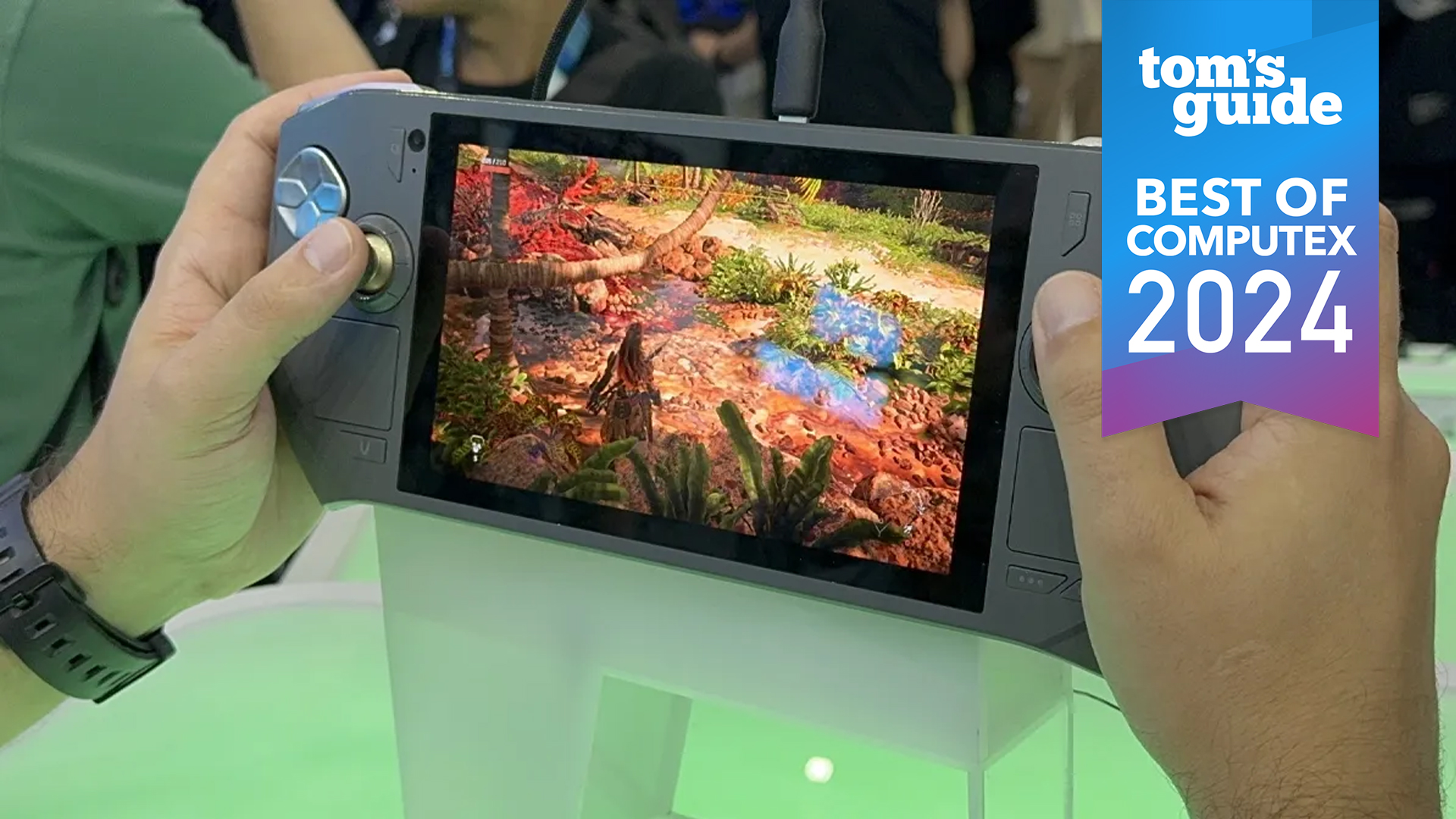
The ROG Ally X got a spec bump and MSI debuted a new version of its handheld in the form of the MSI Claw 8 AI Plus but the Zotac Zone came out of nowhere at Computex this year. We had seen a teaser for the company’s new PC gaming handheld before heading to Taipei but much to our surprise, it was out on the show floor in near final form.
The Zotac Zone features an AMD Ryzen 7 8840U processor with built-in AMD Radeon 780M graphics. The device will also have 16GB of LPDDR5 RAM, a 48.5 WH battery, 512GB of storage and a 7-inch FHD AMOLED screen with a 120Hz refresh rate and a max brightness of up to 800 nits.
What really surprised me about the Zotac Zone is how the company listened to its community and made sure to include all of the features they wanted along with a few useful extras to boot. The handheld has Hall Effect joysticks to prevent stick drift with dual trackpads underneath them, two remappable back buttons, a kickstand, a microSD card slot and a USB port on both the top and the bottom. As for the extras, the rings around the joysticks can be used to adjust the device’s volume or even to scroll through menus in-game and there’s a front-facing camera which can be used to live stream your play sessions while gaming.
Every good PC gaming handheld needs a dock to go with it and Zotac had one to show off as well. It has two USB-A ports for your peripherals along with a USB-C port, Ethernet and a hard-wired USB-C cable to plug in the Zotac Zone. However, when you flip the dock over, there’s room to add a M.2 SSD so that you can have extra games to play when docked at home for when the device’s internal storage is all filled up.
The Zotac Zone is by no means a finished device but it was great to see a working version of it on the show floor. It ran Horizon Forbidden West fairly well and I liked the weight and feel of it along with the symmetrical joysticks like on Valve’s Steam Deck. Anthony Spadafora
Best gaming desktop: MSI MEG AI X
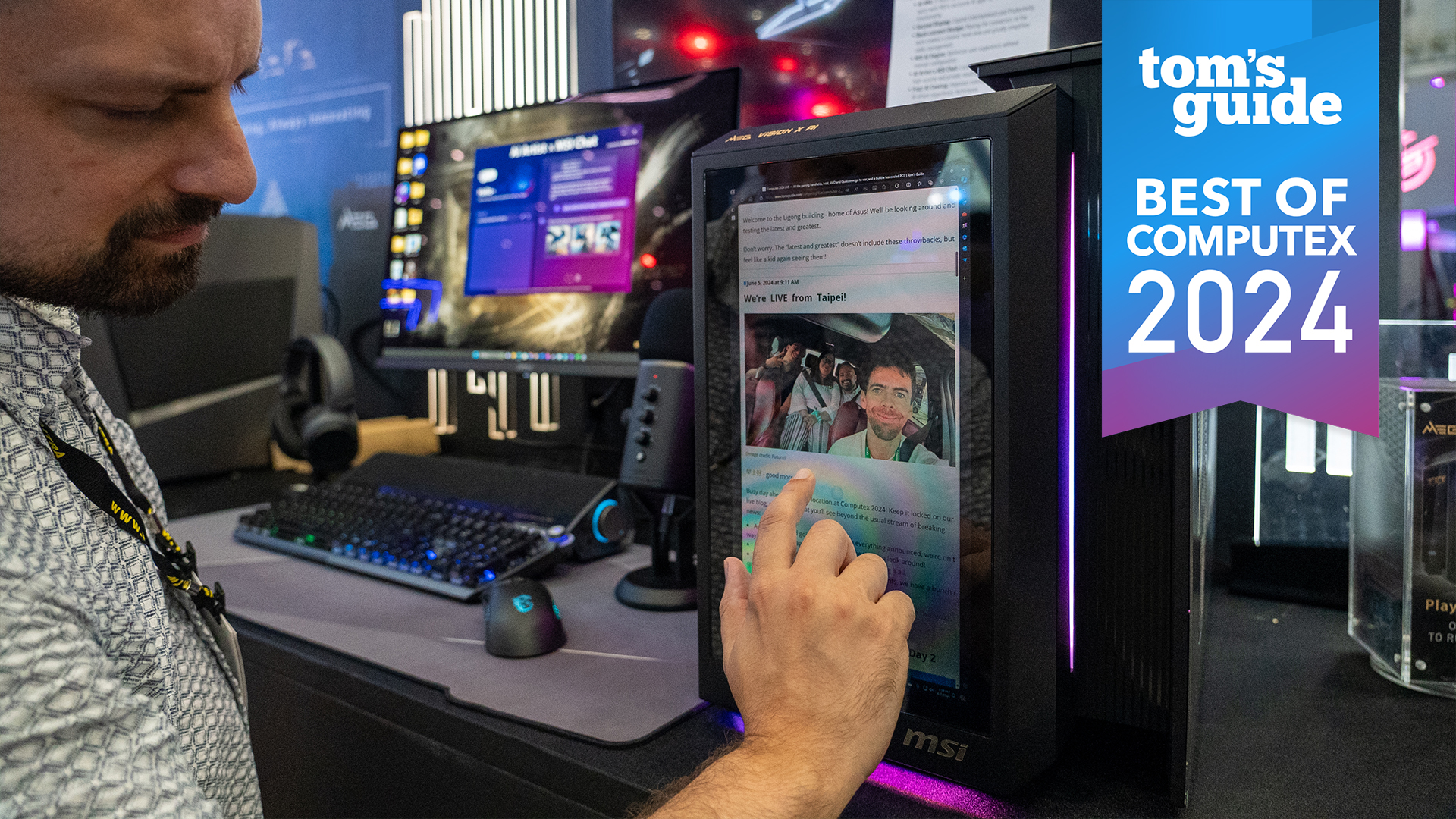
Can your gaming PC double as a second monitor and actually be practical? MSI seems to think so with their recently revealed MEG Vision X AI desktop — and after trying it out, I’m inclined to agree.
With its massive 13.3” vertical touch-screen, you can display a bunch of useful widgets, quickly launch desktop apps, change power performance modes from Extreme to Quiet when you need to take a call, or, as I mostly did, watch our latest Computex 2024 TikTok coverage through the browser. The interface was fast, intuitive, and downright fun to use.
We've seen displays find their way into desktops before, like with the MEG Trident X2, but they’re typically much smaller and reserved for more basic tasks like changing your computer’s lighting effects or power mode. MSI is pushing the envelope with the Vision X by treating its display as a full-fledged secondary monitor. You can display anything you want, either by launching it directly from its touch screen interface or by dragging it over from your main display using your mouse or keyboard.
So where does the AI part come into it? Well, the vision X uses MSI’s AI engine to help optimize system performance, lighting effects, and audio settings. It can also handle local and cloud AI tasks with MSI Artist and MSI Chat, allowing you to create and summarize files, generate text and images quickly, and more.
Pricing and configurations are still unconfirmed, but the MEG Vision X AI is expected to release sometime later this year or early next. This innovative desktop is a game-changer for those who crave functionality and a touch of futuristic flair in their PC setup. Paul Antill
Best Monitor: MSI MEG 321URX QD-OLED
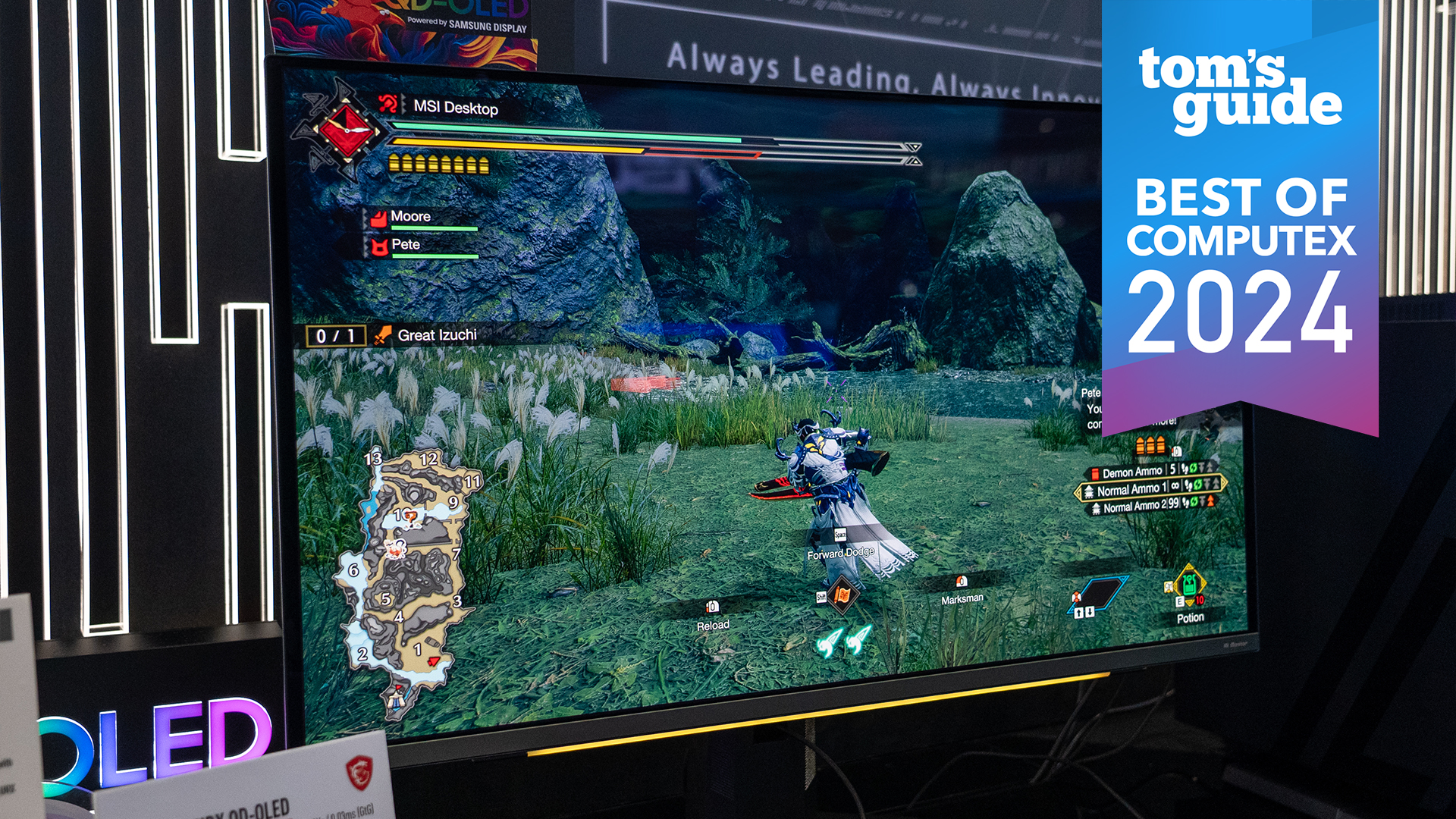
Every once in a while, there’s a gaming monitor that comes along that surprises you in more ways than one. This was absolutely the case with the MEG 321URX QD-OLED from MSI. This 31.5-inch QD-OLED gaming monitor is a sight to behold on its own thanks to its gorgeous display and incredibly thin design but it’s what’s under the hood that really stands out.
This is the world’s first AI gaming monitor and it comes equipped with a new technology MSI is calling AI Skysight. It uses the display’s built-in AI engine to scan a game’s minimap for enemies and other threats and their location is then highlighted on the monitor’s HUD. This will certainly be a controversial feature for some given that it can give competitive players an unfair advantage. However, it could also be quite useful for gamers with vision impairments.
What really impressed me about the MSI MEG 321URX though was the light bar at the base of the monitor. MSI refers to this as a Spectrum Bar and it uses image recognition technology to show your player’s in-game stats in a way that isn’t overly distracting. For instance, it can be set to show your character’s remaining ammo, health or other stats. This way, you can quickly know when it’s time to reload or time to heal using your peripheral vision. MSI used Monster Hunter to demo this feature and as my character fired their gun away, the Spectrum Bar got smaller before blinking when I was almost out of ammo.
The MSI MEG 321URX also has all of the ports you’d need for connecting a high-end gaming PC or even a PS5 or Xbox to take advantage of its 240Hz refresh rate. There’s two HDMI 2.1 ports, one DisplayPort 2.1, a USB-C port with up to 98W of power delivery, three USB-A ports and a headphone jack. These USB-A ports let you use the monitor’s built-in KVM switch to use your mouse, keyboard and other peripherals across devices without having to unplug them.
The MSI MEG 321URX is certainly a premium gaming monitor with a price tag of $1,700 but it could be the ultimate upgrade for those looking to take their battlestation to the next level. Anthony Spadafora
Best AI innovation: Nvidia Project G-Assist
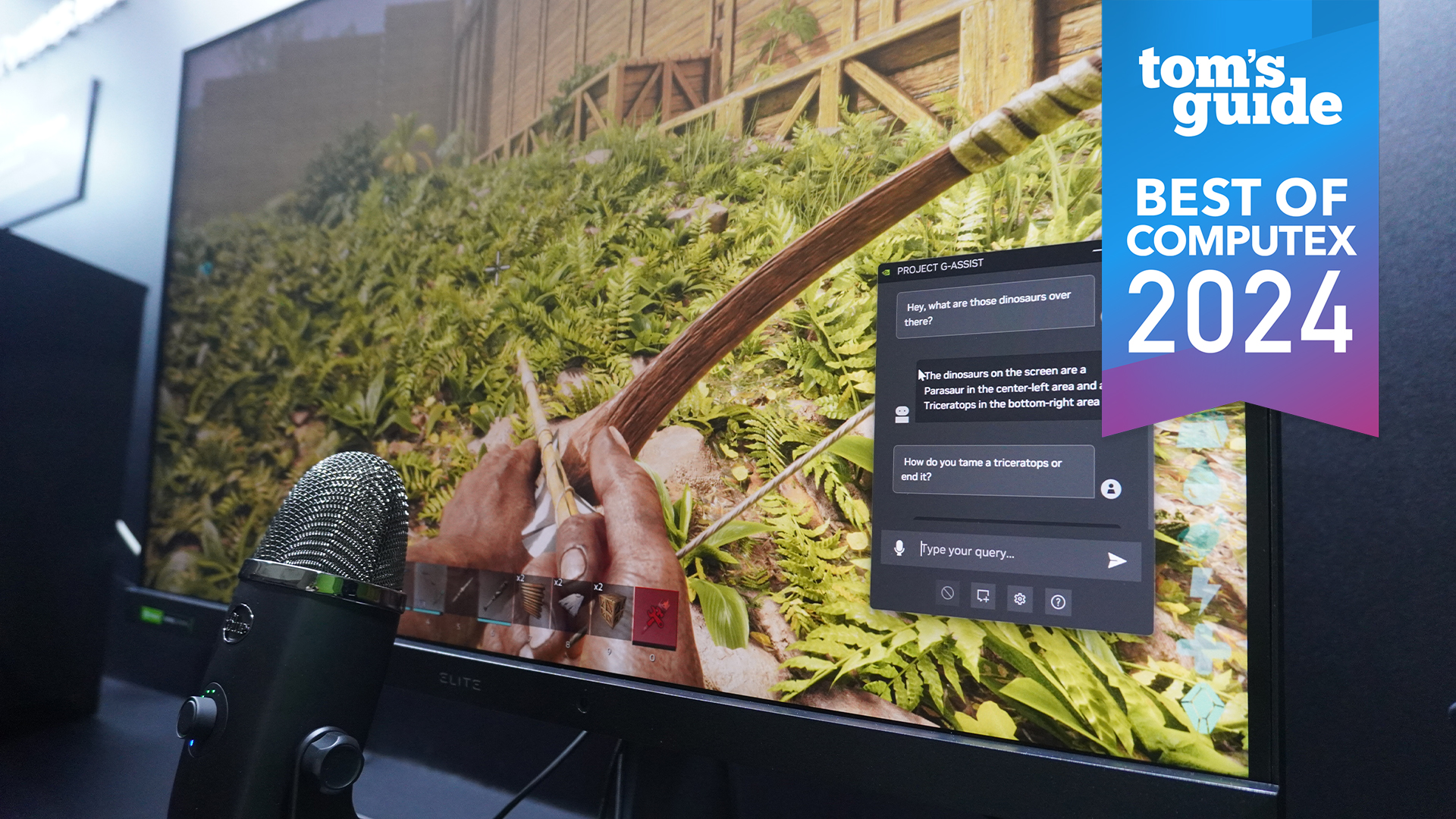
Basically, it’s an AI assistant for your games. But it’s so much more than that and if anything, I think Nvidia undersold it in our demo. This is another example of the hotly anticipated next generation of assistance — the AI Agent.
Did you know it started as an April Fool’s prank back in 2017? Named GeForce GTX G-Assist, the humorous concept showed the presenter going to greet the pizza guy while the G-Assist played the game for him.
Well, now the prank has (sort of) become a reality. Currently, it’s a multimodal AI that can be trained on data related to the game. In the demo I saw, it became an encyclopedia that could answer questions and give advice on how to progress. But on top of that, it brings PC performance tweaking to the masses, as you can ask it to overclock your GPU and it’ll take action.
But in terms of how far this can go, that’s up to developers because the tech behind it is wide open. Maybe it could be a huge revolution in accessibility by asking it to tweak in game AI or even play certain sections for you! It’s early doors, but the options are endless and very exciting. Jason England
Best Router: Asus ROG Rapture GT-BE19000
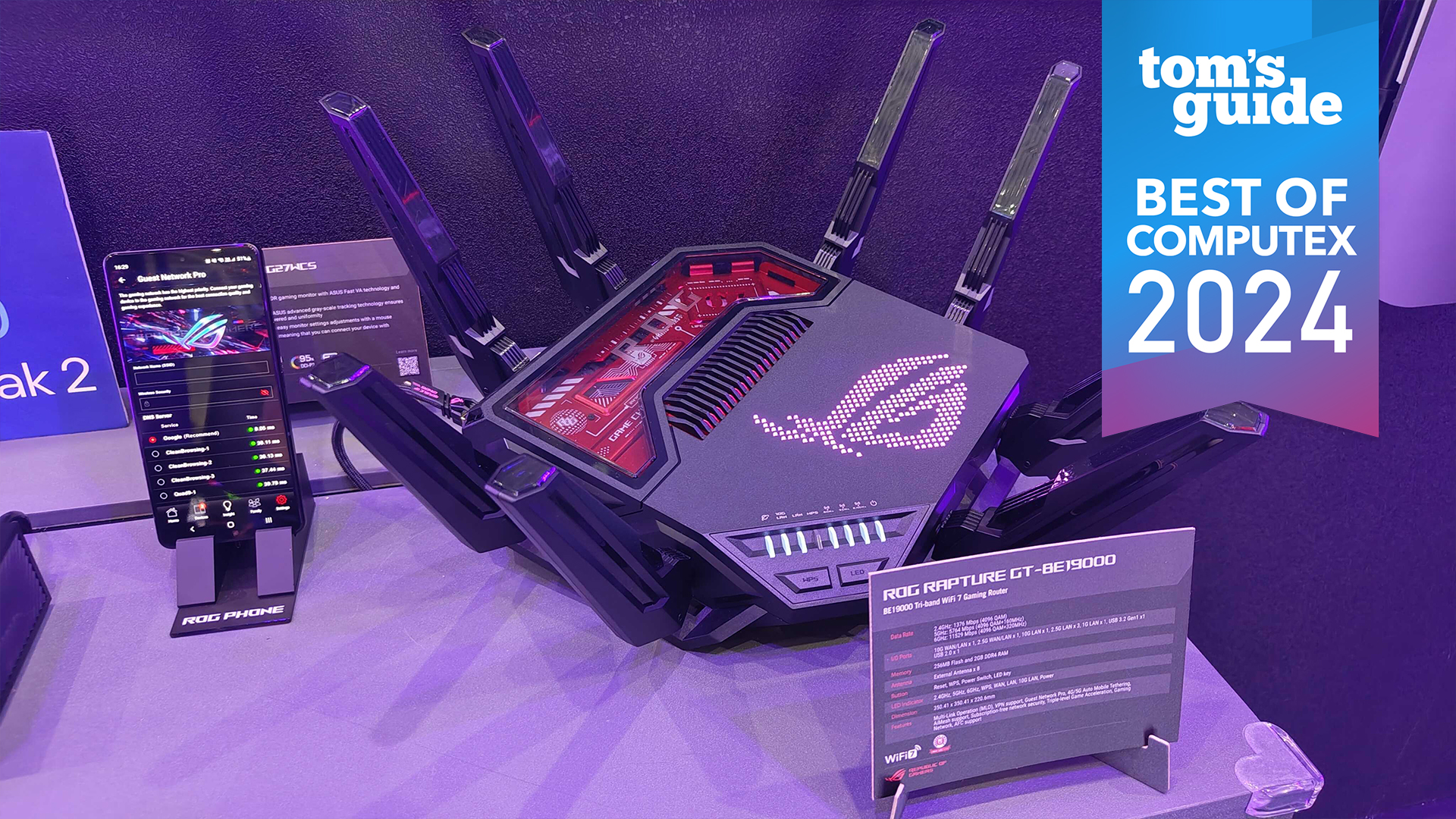
Powerful Wi-Fi 7 performance with that sleek ROG aesthetic is exactly what you’re getting with the ROG Rapture GT-BE19000 gaming router from Asus. This tri-band gaming router comes in either black and red or white and black and it has eight external antennas you can reposition to fine tune the coverage of your home network. However, it also has a unique trick up its sleeve that can help you get faster speeds with even more range.
One of the biggest problems that you’ll often find with both the best Wi-Fi 6E and the best Wi-Fi 7 routers is that the newer and faster 6 GHz band just doesn’t have the same range as either the 5 GHz or 2.4 GHz ones. As such, you often have to be in the same room or right next your Wi-Fi 7 router to make the most of it. To get around this with the ROG Rapture GT-BE19000 though, Asus is using AFC or Automated Frequency Coordination to boost the 6 GHz band’s power. In fact, with AFC enabled, the ROG Rapture GT-BE19000 has up to 63 times more power.
As for what else you’ll find on this high-end gaming router, the ROG Rapture GT-BE19000 has a 10 Gbps port or a 2.5 Gbps that connects to your cable modem along with another 10 Gbps Ethernet port and three 2.5 Gbps ports for connecting all of your wired devices. However, you also get two USB-A ports (one USB 3.2 Gen1 and one USB 2.0) for sharing data from a flash drive or external hard drive across your network. Asus also packs in game acceleration features and built-in AI-powered security to keep your gaming sessions lag free and secure. Anthony Spadafora
Coolest concept: Asus Project Dali
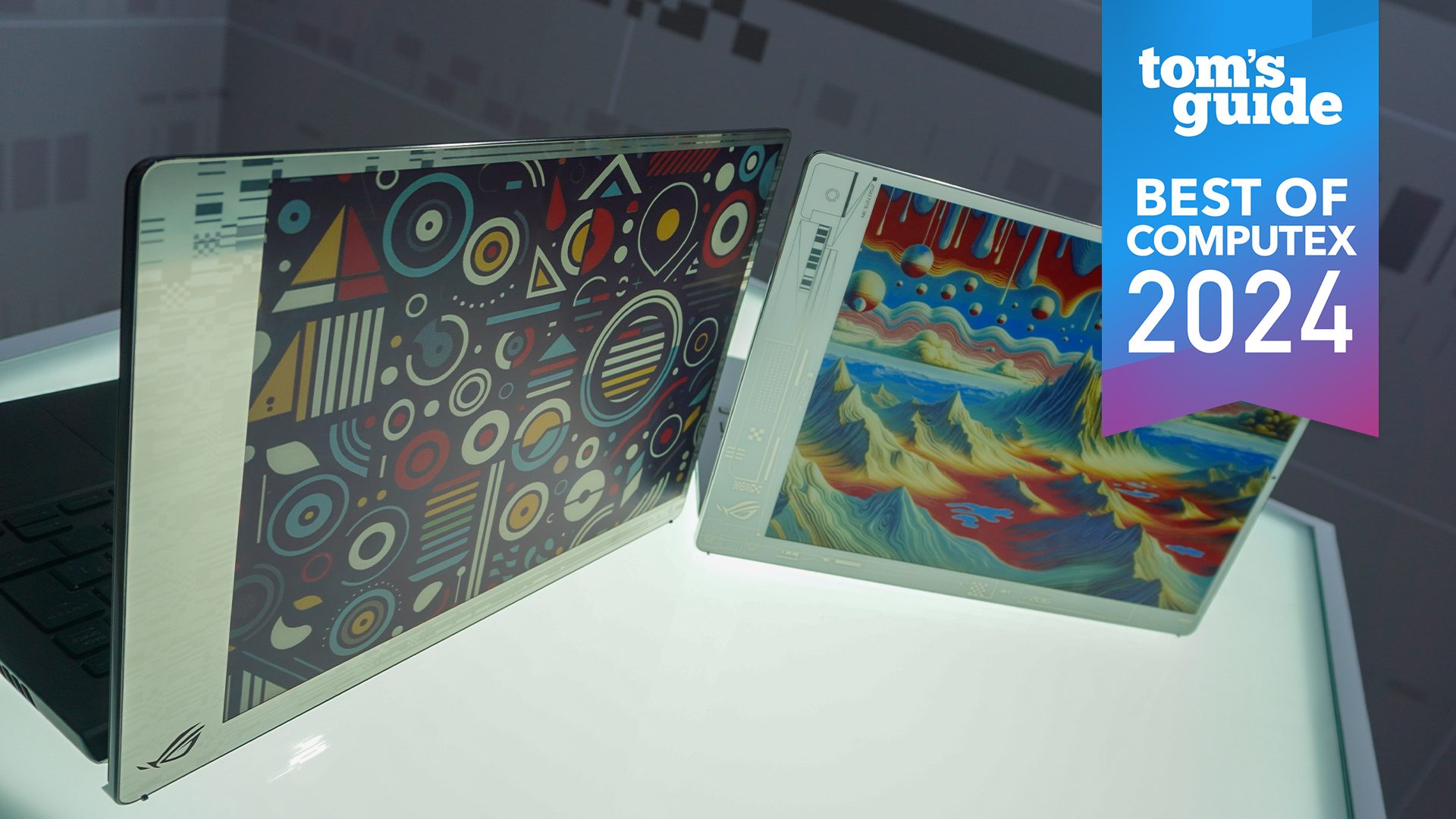
Though you can build your own custom desktop PC that stands out from the crowd by 3D printing a case, the same can’t be said for your laptop. When it comes to customizing your laptop, you have two options: get a case or cover it in stickers. The former can be hard if you buy a less popular laptop while the latter comes with its own problems in the form of peeling stickers and leftover adhesive.
Asus has come up with a better way though and the company showed it off both at its booth on the show floor of Computex and during our tour of Asus HQ. With Project Dali, you can completely customize the look of your laptop thanks to the 12-inch, color e-ink screen on the lid.
With just the tap of a button, you can pick between a number of curated images, AI-generated images or even use your own pictures to change what’s displayed on the back of this concept laptop. We’ve seen e-ink screens on laptops before but they were touted as a productivity feature. Project Dali on the other hand is all about giving your laptop its own unique look.
The best part of Project Dali is that since this is an e-ink screen after all, having a custom picture on the back of your laptop doesn’t drain your battery or use up your computer’s resources. Instead, once the e-ink changes and your picture sets, Project Dali doesn’t use any battery. In fact, even if your laptop’s battery dies, your picture will still be there.
Asus used a Zephyrus G14 for this concept design but I hope it finds its way into the company’s other laptops soon. Project Dali is a total game changer for people who enjoy giving their devices their own custom look and feel. Anthony Spadafora
Best health tech: ASUS VivoWatch 6
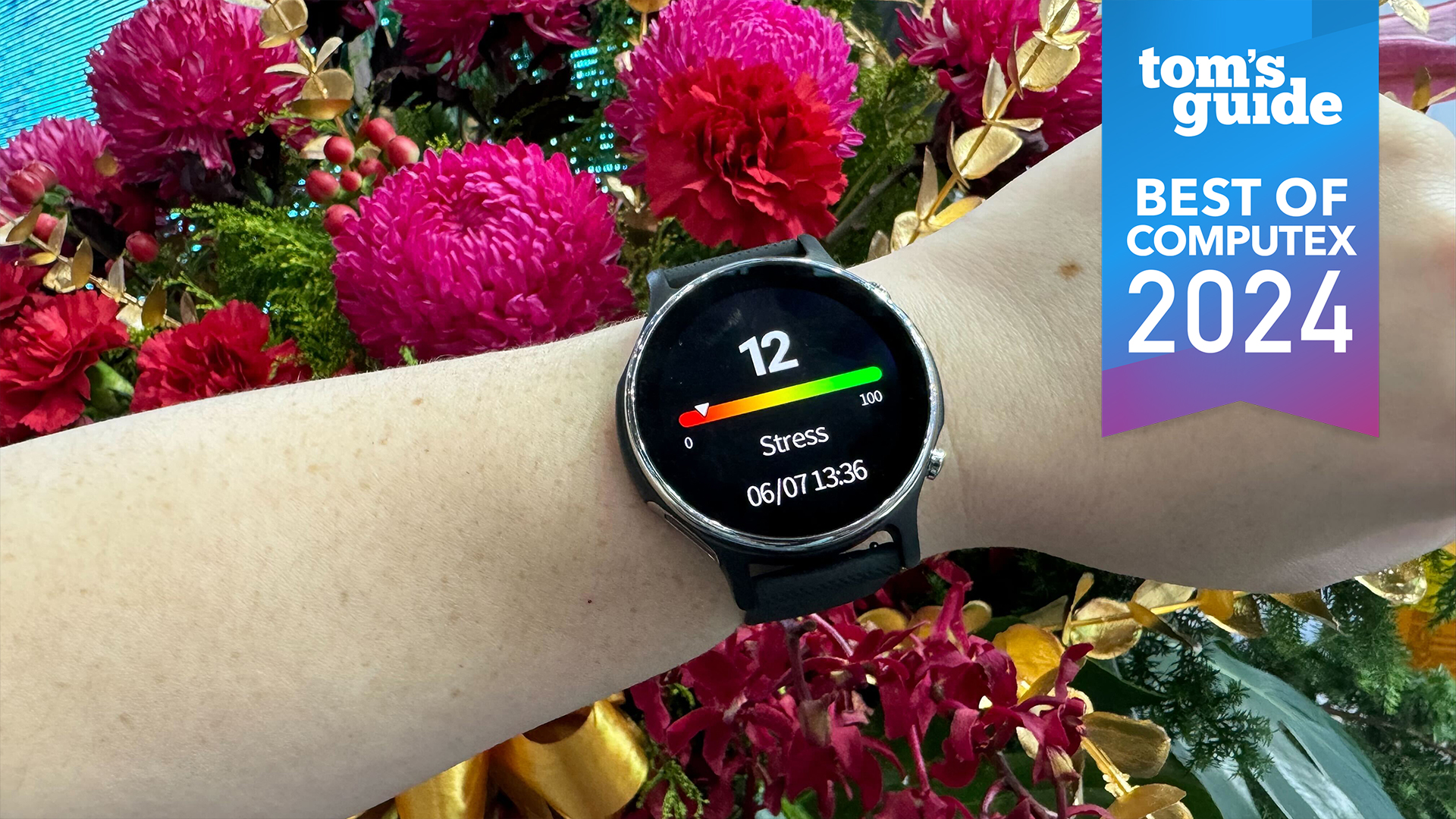
The Asus VivoWatch 6 puts wellness at your fingertips by capturing physiological data in a whole new way. Using a proprietary side sensor, this is the world’s first smartwatch that uses the tip of the finger instead of the traditional wrist measurement of other best smartwatches. Because your fingers have a greater density of blood vessels, it produces a faster, more accurate result with a lighter touch.
Alongside this, Asus has made some other big upgrades, with the aim to improve performance and keep the watch on its user’s wrists as long as possible. With a 290mAh battery, the VivoWatch 6 can get up to 14 days of use in power saving mode, or nine days with regular use. This allows for users to continue to provide 24/7 health tracking data using its dual sensors — key for reporting accuracy and monitoring wellness trends.
Asus also uses its own HealthAI 5.0 algorithm and their HealthConnect App — collecting data and providing users with graphs that are easy to navigate and understand. Third party developer support is also allowing for crucial features being used here in Taiwan to allow nurses like myself to monitor vital signs of nursing home residents.
With my hands on with the VivoWatch 6, I found out just how stressed I can get while traveling for tech coverage, as their relaxation index based on heart rate variability had me firmly in the red zone.
With a range of 0 to 100 to describe potential emotion and stress management levels, I was a solid 12. This helped me to listen to a signal from my body that is usually silent, and allowed me to make time for recovery in a way that I hadn’t realized that I needed. That alone made it a worthwhile device for me.
However, along with its standout features does come some downsides, as you will be able to see all of your notifications, but quick reply is restricted to android devices, and some apps like Spotify will display, but lack functionality.
I was also a bit disappointed to see that while there are plenty of color options for their watch bands, the watch itself is only available in a large, bulky design. Still, if Asus can bridge those gaps and provide some variability to its visuals, they have an impressive wearable in the health and wellness space. Mia Owens







